Discuss unlawfulness - Study guides, Class notes & Summaries
Looking for the best study guides, study notes and summaries about Discuss unlawfulness? On this page you'll find 53 study documents about Discuss unlawfulness.
Page 3 out of 53 results
Sort by
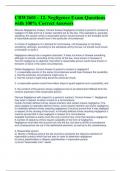
-
CRW2601 - 12. Negligence Exam Questions with 100% Correct Answers
- Exam (elaborations) • 3 pages • 2023
- Available in package deal
-
- $12.99
- + learn more
Discuss Negligence (Culpa). Correct Answer Negligence (Culpa) A person's conduct is negligent if it falls short of a certain standard set by the law. This standard is, generally speaking, the caution which a reasonable person would exercise or the foresight which a reasonable person would have in the particular circumstances. In crimes of negligence X is blamed for not knowing, not foreseeing or not doing something, although, according to the standards set by the law, he should have known or...
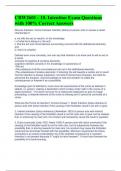
-
CRW2601 - 10. Intention Exam Questions with 100% Correct Answers
- Exam (elaborations) • 2 pages • 2023
- Available in package deal
-
- $12.99
- + learn more
Discuss Intention. Correct Answer Intention (dolus) A person acts or causes a result intentionally if: a. he wills the act or result b. in the knowledge i. of what he is doing (i.e. the act). ii. that the act and circumstances surrounding it accord with the definitional elements, and iii. that it is unlawful. Defined even more concisely, one can say that intention is to know and to will an act or a result. Consists of cognitive & conative elements: Cognitive element consists in X's k...
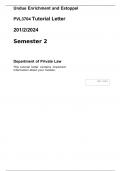
-
Undue Enrichment and Estoppel PVL3704 Tutorial Letter 2024
- Exam (elaborations) • 14 pages • 2024
-
- $10.99
- + learn more
Undue Enrichment and Estoppel PVL3704 Tutorial Letter 201/2/2024 Semester 2 Department of Private Law This tutorial letter contains important information about your module. Dear Student 1 COMMENTARY ON THE ASSIGNMENTS This tutorial letter contains the memorandum, as well as a discussion, of the answers to the two assignments. 1.1 ANSWERS TO ASSIGNMENT 1 Question 1 Discuss in general (without reference to a specific enrichment action) how the extent o...
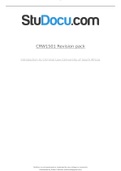
-
crw1501_revision_pack.
- Exam (elaborations) • 61 pages • 2023
-
- $3.00
- + learn more
Question 1 Name the four general requirements of criminal liability Act or conduct Compliance with the definitional elements of a crime Unlawfulness Culpability Define the principle of legality. An accused may (1) not be convicted of a crime – (a) unless the type of conduct with which she is charged has been recognised by the law as a crime (b) in clear terms (c) before the conduct took place (d) without it being necessary to interpret the words in the definition of the crime broad...
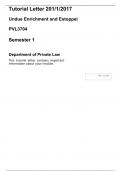
-
Tutorial Letter 201 1 2017 Undue Enrichment and Estoppel PVL3704
- Exam (elaborations) • 10 pages • 2024
-
- $10.99
- + learn more
Tutorial Letter 201/1/2017 Undue Enrichment and Estoppel PVL3704 Semester 1 Department of Private Law This tutorial letter contains important information about your module. Dear Student 1 COMMENTARY ON THE ASSIGNMENTS This tutorial letter contains the memorandum, as well as a discussion, of the answers to the two assignments. Please note that only question 2 of assignment 1 was marked. If you did not answer question 2 you will receive 0 for the assignment. 1.1 ANSWERS T...
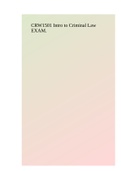
-
CRW1501 Intro to Criminal Law EXAM.
- Exam (elaborations) • 22 pages • 2022
-
- $3.00
- + learn more
CRW1501 Intro to Criminal Law EXAM. UNIT 1 1. Name the four elements of criminal liability. [4] • Act or conduct (1) • Compliance with the definitional elements of the crime (1) • Unlawfulness (1) • Culpability (1) 2. Name and discuss the points of difference between a crime and a delict (you answer should be in “tabular” format or in the form of a table. [12] The most important points of difference between a crime and a delict can be summarised as follows: Crimes : Delic...
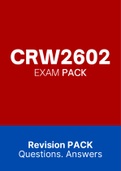
-
CRW2602 EXAM PACK | CRW2602 Questions and Answers | Best Revision PACK | answered | verified answers
- Exam (elaborations) • 174 pages • 2022
-
- $15.49
- + learn more
A person is an accomplice if 1) Although he does not comply with all the requirements for liability set out in the definition of the crime, and 2) Although the conduct required for a conviction is not imputed to him in terms of the doctrine of common purpose, He engages in conduct whereby he furthers the commission of the crime by somebody else. Requirements for liability as an accomplice 1) Act 2) Unlawfulness 3) Intention 4) Accessory character of liability Explain the difference b...
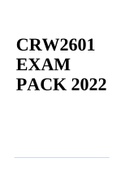
-
CRW2601 EXAM PACK 2022
- Exam (elaborations) • 115 pages • 2022
-
- $3.00
- + learn more
CRW2601 EXAM PACK 2022. Name the four general requirements of criminal liability (4) Act or conduct Compliance with the definitional elements of a crime Unlawfulness Culpability Define the principle of legality. An accused may (1) not be convicted of a crime – (a) unless the type of conduct with which she is charged has been recognised by the law as a crime (b) in clear terms (c) before the conduct took place (d) without it being necessary to interpret the words in the definition o...
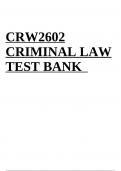
-
CRW2602 _Criminal_Law_Test_Bank.
- Exam (elaborations) • 70 pages • 2023
-
- $4.50
- + learn more
CRW2602 _Criminal_Law_Test_Bank. Question 1 (a) This statement is correct. See SG 1.2.2 (vi). (b) This statement is incorrect. See SG 1.2.7. Dolus eventualis is a sufficient form of intention. (c) This statement is correct. See SG 1.2.6. You should, therefore, have chosen option (4) since only statements (a) and (c) are correct. Question 2 (a) This statement is correct. See SG 1.3.4. (b) This statement is correct. See SG 1.3.4. (c) This statement is correct. See ...
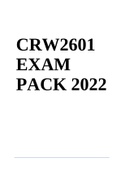
-
CRW2601 EXAM PACK 2022
- Exam (elaborations) • 115 pages • 2022
-
- $3.00
- + learn more
CRW2601 EXAM PACK 2022. CRW2601 - General Principles Of Criminal Law Name the four general requirements of criminal liability (4) Act or conduct Compliance with the definitional elements of a crime Unlawfulness Culpability Define the principle of legality. An accused may (1) not be convicted of a crime – (a) unless the type of conduct with which she is charged has been recognised by the law as a crime (b) in clear terms (c) before the conduct took place (d) without it being necessa...

How did he do that? By selling his study resources on Stuvia. Try it yourself! Discover all about earning on Stuvia


